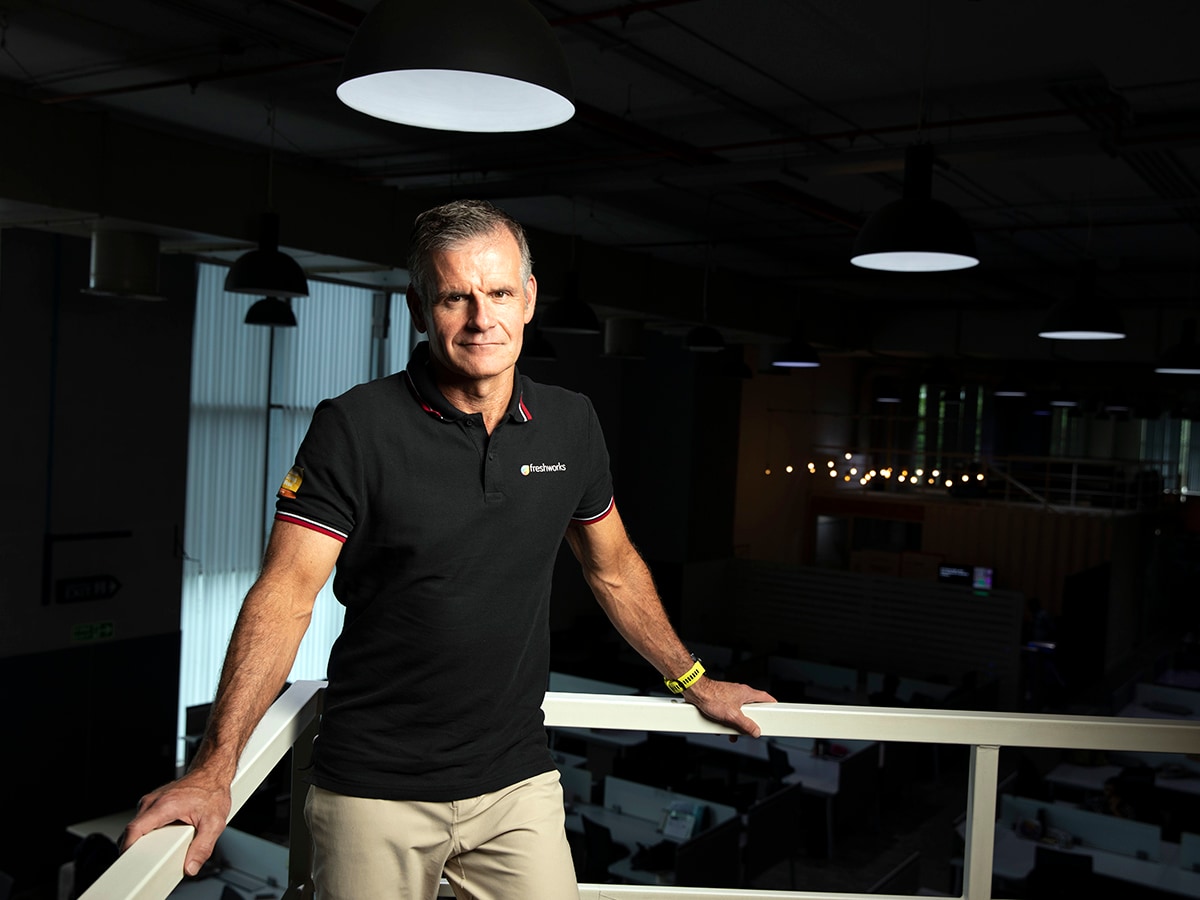 Freshworks CEO Dennis Woodside
Freshworks CEO Dennis Woodside
Image: Balaji Gangadharan for Forbes India
Freshworks announces 13 percent layoff and share buyback plan
Freshworks is laying off 13 percent of its workforce, which will affect 660 people worldwide. Most of the software company’s 5,700-or-so staff are based in India, primarily in Chennai, but also in Bengaluru and Hyderabad.
The decision, despite better-than-expected Q3 results, reflects the tough market conditions the Nasdaq-listed company continues to face, whose stock has been treading levels near historic lows for months now.
The revenue beat plus the announcement to cut costs via the workforce reduction and board approval for a $400 million share buyback plan sent Freshworks’ shares higher by more than 5 percent on the Nasdaq on November 6. Donald Trump’s historic win on the day to become America’s president-elect also lifted US stocks and indices overall.
Freshworks is still lower by more than 40 percent this year, as macroeconomic uncertainties have led businesses to cut tech spending over the last two years. The company is also undergoing a transition, with founder Girish Mathrubootham handing the CEO’s role to Dennis Woodside earlier this year, who’s identified three strategic areas to focus on.
Capillary Tech revives IPO plan—Economic Times report
Capillary Technologies, a Bengaluru-based software company providing customer engagement software, especially focussed on large retailers, is reviving its IPO plans after pausing them in 2021, the Economic Times reported on Thursday, citing sources familiar with the plan.
The company is seeking investment bank proposals and aims to raise up to Rs2,000 crore in the public offering. It is expected to file draft papers in 2025, according to the Economic Times. Capillary, which closed FY24 with $75 million in revenue, has strengthened its US and European presence. Backed by investors, including Warburg Pincus and Peak XV, it recently raised $140 million in funding, including secondary sales.
The company, which manages loyalty programs for customers such as Tata, Aditya Birla, and Domino’s, has expanded through acquisitions, including two in the US, the Economic Times notes in its report.
Swiggy raises more than $605 million from IPO anchor investors
Swiggy has secured more than $605 million from 69 “anchor investors” as part of its $1.35 billion IPO, set to be India’s second-largest listing of the year. The Bengaluru-based food delivery and quick commerce startup is targeting a $11.3 billion valuation, with $15 billion in bids received for the $600 million anchor portion.
Indian institutional investors accounted for 56 percent of the anchor allocation, with eight of the top 10 Indian mutual funds participating. Well-known investors include BlackRock, Fidelity, Norges Bank, BNP Paribas and Citadel, along with Indian lenders’ mutual funds, such as SBI, ICICI and HDFC, TechCrunch noted, reporting the news.
Swiggy is backed by Prosus, SoftBank, Accel and Coatue. Larger rival Zomato listed in Mumbai in 2021.
Government of India invites proposals for green hydrogen Centres of Excellence
The Government of India has invited proposals for establishing Centres of Excellence (CoE) under its National Green Hydrogen Mission, aimed at advancing green hydrogen technologies, according to a press release from the Ministry of New and Renewable Energy.
The call seeks to foster innovation in green hydrogen production, storage and utilisation. With an allocation of Rs100 crore, the CoEs will serve as hubs for research, skill development and collaboration across industry, academia, and government. The initiative aligns with India’s broader clean energy goals, outlined in the National Green Hydrogen Mission, launched in January 2023 with an outlay of Rs19,744 crore.
By 2030, the mission aims to reduce fossil fuel reliance, promote energy independence, and position India as a global leader in green hydrogen. Public and private entities, including universities and research institutions, are encouraged to submit joint proposals.
Australia to ban social media access for children under 16
Australia is set to ban social media access for children under 16 as part of a broader initiative to safeguard youth mental health, Prime Minister Anthony Albanese announced on Thursday, Bloomberg reports. The government will introduce legislation later this month, placing responsibility on platforms to enforce the age restrictions or face fines, according to Bloomberg.
The new rules aim to combat the growing impact of social media on young people’s well-being, with the prime minister citing harm from misinformation and mental health issues. Social media companies will be required to take steps to prevent access, with no penalties for users.
This move follows previous actions, including Australia’s push for Facebook and Google to pay for news content. The government is also considering new laws targeting misinformation on social platforms. While consultations with tech firms have occurred, details on enforcement and potential penalties remain unclear.
